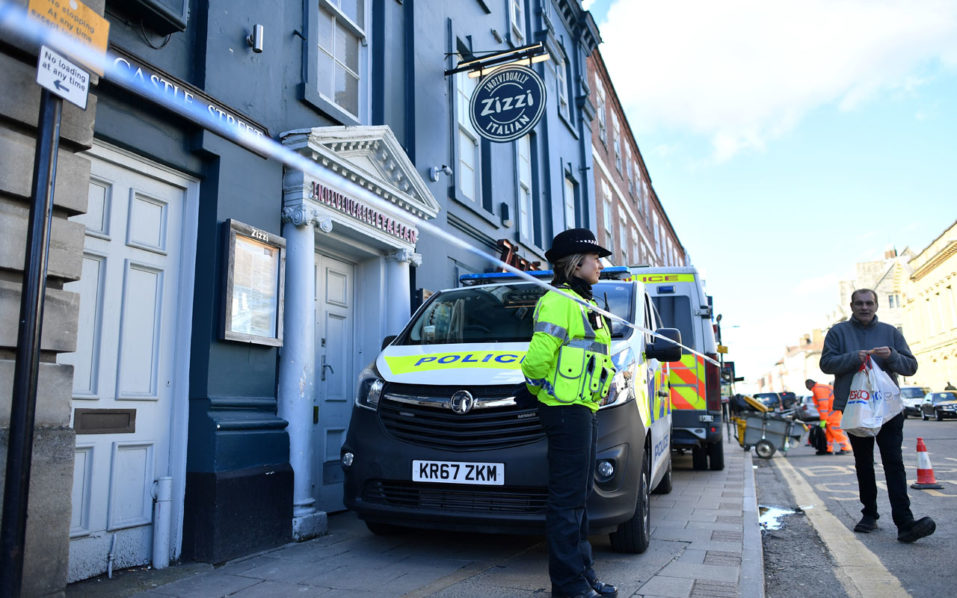
British detectives on Thursday scrambled to find the source of the nerve agent used in the “brazen and reckless” attempted murder of a Russian former double-agent and his daughter.
Sergei Skripal, 66, who moved to Britain in a 2010 spy swap, is unconscious in a critical but stable condition in hospital along with his daughter Yulia after they collapsed on a bench outside a shopping centre on Sunday.
British media and politicians have pointed the finger at Russia, sparking an angry response in Moscow.
Prime Minister Theresa May warned Thursday that “if action needs to be taken then the government will do that”, but urged “time and space” for the police to conduct their investigation.
Interior minister Amber Rudd earlier called the attack “brazen and reckless” and “attempted murder in the most cruel and public way”. She said Britain “will act without hesitation as the facts become clearer”.
A policeman also fell ill after coming to their aid and remains in a serious but stable condition and is “conscious, talking and is engaging,” Rudd added.
Russia suspected
On Wednesday, British police confirmed for the first time that a nerve agent was used and that their probe was now an attempted murder investigation.
“Police are now in a position to confirm that their symptoms are a result of exposure to a nerve agent,” said the Metropolitan Police.
“Scientific tests by government experts have identified the specific nerve agent used which will help identify the source.”
The Times newspaper reported on Thursday that Skripal’s condition was particularly severe, quoting a senior unnamed British government official.
“The feeling is that he is not going to make it out of this,” the source said. “I think it could be more positive (for Yulia).”
Police have cordoned off an Italian restaurant and a pub that the pair are believed to have visited.
A diner in the restaurant told the Times that Skripal had eaten there on Sunday and that he was in an agitated state.
“He was going absolutely crazy, I didn’t understand it and couldn’t understand them,” the witness said.
“He didn’t seem ill physically but perhaps mentally ill with the way he was shouting.”
Police say they are keeping an open mind about what happened, but Foreign Secretary Boris Johnson has alluded to Russia.
He noted the “echoes” with the 2006 poisoning in London of former Russian spy and Kremlin critic Alexander Litvinenko, which Britain has blamed on Russia.
Defence Secretary Gavin Williamson told British television on Thursday that Russia was “becoming an ever-greater threat”.
Fellow Conservative MP Nick Boles tweeted that “I do not see how we can maintain diplomatic relations with a country that tries to murder people on British soil”.
Moscow accused British politicians and journalists of whipping up anti-Russian sentiment.
Kremlin foreign ministry spokeswoman Maria Zakharova telling reporters the story “was straight away used to boost an anti-Russian campaign in the media”.
World Cup threat
Hundreds of counter-terrorism detectives are working “around the clock” to create a timeline of the victims’ movements, with “many hours” of CCTV under review, police said.
The Times reported police are probing whether Skripal’s daughter, who arrived in Britain from Moscow last week with “gifts from friends”, may have inadvertently brought in the nerve agent.
The paper previously said investigators would also examine the 2012 death of Skripal’s wife from cancer and that of his 44-year-old son last year in St Petersburg, reportedly from liver problems.
Prime Minister Theresa May confirmed the government might consider a boycott by British officials and dignitaries of the 2018 football World Cup in Russia if it were found to have been involved.
Multiple British media reported Wednesday that Prince William would not be attending, although it was not clear when this decision was taken.
Skripal was a former colonel in Russian military intelligence who was jailed in his country for betraying agents to Britain’s MI6 secret service.
He was pardoned before being flown to Britain as part of a high-profile spy swap involving Russia and the United States in 2010.
[ad unit=2]



